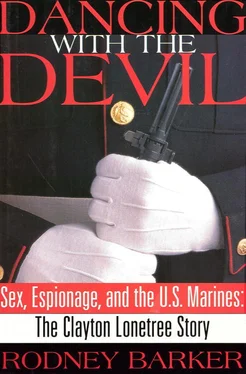This was all so different from anything he had expected. Before coming, he had read about the gulags and the brutality of the Communist system and that all Russians slavishly adhered to Marxist-Leninist beliefs. At MSG school, it had been drilled into him that the Russians were the enemy and you had to always be on your guard because no one could be trusted. But once here, after getting to know the Russian people, he’d come to find that many of them did not necessarily believe what their government told them and had been skeptical of the party line about many things for a long time. The majority of those he’d met were not anti-American but in fact wanted to know more about the West. They enjoyed talking to foreigners and expressed the hidden desire to someday travel outside their borders. And whereas Americans who came to Russia were primed for discussions of the differences between socialism and capitalism, most Russians, when you had genuine encounters with them, were put off by politics and would rather hear about you and your life. Or talk about the clothes you were wearing—sometimes as a prelude to trying to buy them from you.
At the same time that he was beginning to decide that the Soviet menace had been exaggerated and the Russians were decent people who were simply misinformed, he and Violetta began to discuss their feelings for each other. It was good between them; there was no one else he could talk to about what he was thinking and feeling; and their sweet collusion led inevitably to a conversation about what it would be like to share life together.
By this time he had extended his stay in Moscow for an additional three months but was scheduled to be transferred to Vienna in March. She said his upcoming departure distressed her. She told him she didn’t want him to go. She said she loved him and wanted to marry him. She wanted him to stay in Moscow or she wanted to go to the United States, she didn’t know, she didn’t care, she just wanted to be with him. She expressed the desire to see New York and visit his hometown of St. Paul.
It seemed she truly spoke from her heart, and so he did not listen to his head but followed his heart and told her that was what he wanted too. He promised to immediately make inquiries at the embassy regarding U.S.-Soviet marriages and the prospects of acquiring a visa for her.
It was several days after they discussed the issue of a visa that Violetta told him she had an uncle in whom she had confided about their relationship and who wanted to meet him.
That surprised Lonetree. They had gone to great lengths to avoid anyone’s seeing them together. To bring another person into the equation seemed dangerous.
“I don’t know,” he said. “Are you sure he’s not a KGB agent?”
She laughed and he asked her what was so funny.
“He asked me if you were a CIA agent. No, he’s my mother’s brother, my uncle, and he’s a lawyer. He’s not a KGB agent.”
Lonetree still wasn’t sure if he should. As he described his thinking, “Then I figured, Hell, I’m already in enough trouble as it is. If they have photographs of me with her they could send them to the embassy and they’d say, What were you doing with this girl? And they’d send me back to the States.”
It was in late December 1985 that he met her at the Moscow University metro, where they boarded a bus that took a long, circuitous route before reaching their stop. They entered an apartment building through what seemed like a hidden front door and took the elevator to one of the upper floors.
By the way Uncle Sasha greeted Violetta, Lonetree was convinced she was his niece. He kissed her on the cheek, she asked him how he was doing, he said fine, he complained about someone at work, and then he turned his attention to the Marine in their midst. His English wasn’t very good, so Violetta translated, and he explained that he felt like a father to Violetta and her younger sister.
“Would you like something to drink?” Uncle Sasha asked. And before Lonetree could answer, Sasha said, “I have wine. Do you like wine?”
“Yes,” he replied, watching to make sure nothing was dropped in his drink, as Uncle Sasha poured them each a glass.
The conversation that followed dwelt on Lonetree’s Indian heritage. Uncle Sasha talked about the Russian fascination with American Indians, with whom there was an ancestral link because they were descended from the indigenous people of Siberia, and about how Soviet officialdom spoke out in behalf of the rights of American Indians at international human-rights conferences. He condemned the historical treatment of Indians by the American government and asked whether or not Lonetree felt he had been discriminated against because of his race. Lonetree said he had, but that was life, and Uncle Sasha indicated not in the Soviet Union it wasn’t. Here everyone was treated the same.
At the conclusion of the meeting, as Uncle Sasha shook Lonetree’s hand, he said, “You’re different from what I expected. Prior to meeting you, I was planning on forbidding Violetta from seeing you again.” His final words were that he hoped that Lonetree would come and visit him again.
A few weeks later he and Violetta returned to Uncle Sasha’s apartment, and over another glass of wine Uncle Sasha, whose English had improved markedly, directed the conversation toward politics. He asked Lonetree his opinion about a variety of international issues, and the two talked about what was wrong with the world and how each would improve it if he had the power. No one in the embassy had ever expressed an interest in Lonetree’s thoughts on foreign affairs, but now that his viewpoints were solicited he gave them freely. And Uncle Sasha listened attentively before expressing his own. He was pointedly critical of President Reagan, who had maligned Russia as an “Evil Empire,” but saved his most scathing comments for CIA Director William Casey. He considered Casey the ultimate capitalist—dedicated to the destruction of the great socialist state—and opponent of world peace and cited numerous examples of the CIA’s acting in ways that were intended to undermine the Soviet Union’s internal security and destabilize the international scene.
As for the CIA’s activities right there in Moscow, he talked about clandestine operations intended to recruit spies, collect information, and encourage Soviet dissident organizations, and about how the CIA tried to take advantage of the difficulties and hardships the Soviet people were undergoing. The intelligence agencies of the U.S.S.R. were merely standing guard over the security of the Soviet state, Uncle Sasha explained. The sole reason for their existence was to counter the aggressions of the CIA.
As Lonetree listened, he had to concede that it did look as though the CIA’s agenda was geared more toward perpetuating American interests than toward fostering harmony in international affairs. And he thought maybe Uncle Sasha had a point when he argued that in the pursuit of its objectives, the CIA was subverting the desire of all the people of the world who were striving for a happier and better life.
They continued to drink, and to talk, until Uncle Sasha swerved the conversation in a disturbing direction by saying, “You can help, you know.”
“How?” Lonetree asked.
“Do you know anyone in the CIA in the embassy?”
Trying to remember this pivotal moment from the distance of a year later and the thousands of miles between Moscow and the Quantico brig, Lonetree would be unable to organize his motivations for continuing with this whole business into a single conscious thought. He would recall that he had read with fascination many books about spies and the KGB, so he felt he was particularly well equipped for encountering intrigue in the real world. In other words there was a bit of game playing on his part going on. The adventure and the risk involved added a thrilling dimension to what had otherwise been boring duty.
Читать дальше












